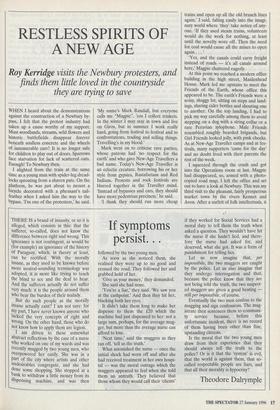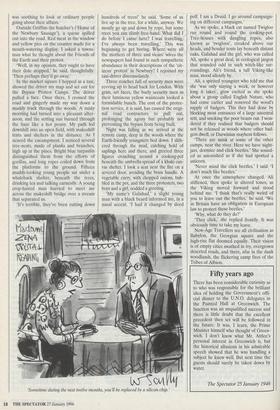RESTLESS SPIRITS OF A NEW AGE
Roy Kerridge visits the Newbury protesters, and
finds them little loved in the countryside they are trying to save
WHEN I heard about the demonstrations against the construction of a Newbury by- pass, I felt that the protest industry had taken up a cause worthy of my support. Must woodlands, streams, wild flowers and historic battlefields disappear forever beneath soulless concrete and the wheels of innumerable cars? It is no longer safe for children to play out of doors. Sparrows face starvation for lack of scattered oats. Enough! To Newbury then.
I alighted from the train at the same time as a young man with spider-leg dread- locks sprouting from a shaven pate. On the platform, he was just about to mount a bicycle decorated with a pheasant's tail- feather when I asked him the way to the bypass. 'I'm one of the protesters,' he said. `My name's Mark Randall, but everyone calls me "Magpie", 'cos I collect trinkets. In the winter I may stay in town and live on Giros, but in summer I work really hard, going from festival to festival and to confrontations, trading and selling things. Travelling's in my blood.'
Mark went on to criticise rave parties, whose patrons had `no respect for the earth' and who gave New-Age Travellers a bad name. Today's New-Age Traveller is an eclectic creature, borrowing his or her style from gypsies, Rastafarians and Red Indians. Protests and rock festivals are blurred together in the Traveller mind. `Instead of bypasses and cars, they should have more pedestrian precincts,' he said.
`I think they should run more cheap trains and open up all the old branch lines again,' I -said, falling easily into the imagi- nary world where 'they' take notice of any- one. 'If they used steam trains, volunteers would do the work for nothing, at least until the novelty wore off. Then the need for coal would cause all the mines to open again . . . '
'Yes, and the canals could carry freight instead of roads — it's all canals around here,' Magpie chattered eagerly.
At this point we reached a modern office building in the high street, Maidenhead House. Mark led me upstairs to meet the Friends of the Earth, whose office this appeared to be. The earth's Friends were a noisy, shaggy lot, sitting on steps and land- ings, sharing cider bottles and shouting one to another. On the top landing, I had to pick my way carefully among them to avoid stepping on a dog with a string collar or a rare Peruvian xylophone. Male Friends resembled roughly bearded brigands, but Girl Friends looked jolly, with pink cheeks. As at New-Age Traveller camps and at fes- tivals, many supporters 'came for the day' and no doubt lived with their parents the rest of the week.
I squeezed through the crush and got into the Operations room at last. Magpie had disappeared, so, armed with a photo- copied road map, I left the office and set out to have a look at Newbury. This was my third visit to the pleasant, fairly prosperous market town by the rivers Kennet and Avon. After a surfeit of folk intellectuals, it was soothing to look at ordinary people going about their affairs.
Outside Griffins the butcher's (`Home of the Newbury Sausage'), a queue spilled out into the road. Red meat in the window and yellow pies on the counter made for a mouth-watering display. I asked a towns- man what he thought about the Friends of the Earth and their protest.
`Well, in my opinion, they ought to have their dole stopped,' he said, thoughtfully. `Then perhaps they'd go away.'
In the market square I hopped in a taxi, showed the driver my map and set out for the Bypass Protest Camps. The driver pulled a face. Once there, I crossed the road and gingerly made my way down a muddy track through the woods. A misty morning had turned into a pleasant after- noon, and the setting sun burned through the haze like a hot penny. My path led downhill into an open field, with makeshift tents and shelters in the distance. As I neared the encampment, I noticed several tree-nests, made of planks and branches, high up in the pines. Bright blue tarpaulin distinguished them from the efforts of gorillas, and long ropes coiled down from the platforms to the ground. Fifteen muddy-looking young people sat under a whaleback shelter, beneath the trees, drinking tea and talking earnestly. A young crop-haired man hurried to meet me across the makeshift bridge over a stream that separated us.
It's terrible, they've been cutting down hundreds of trees!' he said. 'Some of us live up in the tree, for a while, anyway. We mostly go up and down by rope, but some trees you can climb free-hand. What did I do before I came here? I was travelling, I've always been travelling.' This was beginning to get boring. Where were all the mothers of three and vicars' wives the newspapers had found in such sympathetic abundance in their descriptions of the 'cit- izens' protest' in Newbury? I rejoined my taxi-driver disconsolately.
Three coaches full of security men were revving up to head back for London. With grim, set faces, the burly security men in their luminous yellow waistcoats looked a formidable bunch. The cost of the protec- tion service, it is said, has caused the origi- nal road contractors to pull out, prolonging the agony but probably not preventing the bypass from being built.
Night was falling as we arrived at the remote camp, deep in the woods where the Earth-friendly youngsters bed down. I slith- ered through the mud, catching hold of saplings here and there, and greeted three figures crouching around a cooking-pot beneath the umbrella-spread of a khaki can- vas shelter. I took a seat near the fire on a severed door, avoiding the brass handle. A vegetable curry, with chopped onions, bub- bled in the pot, and the three protesters, two boys and a girl, nodded a greeting.
`My name's Galahad,' a slight young man with a black beard informed me, in a nasal accent. 'I had it changed by deed `Sometime during the next twelve months, you'll be replaced by a silicon chip.'
poll. I am a Druid. I go around campaign- ing on different campaigns.'
As we spoke, a black cat named Twigloo ran round and round the cooking-pot. Tree-houses with dangling ropes, also known as `twigloos', creaked above our heads, and bender tents lay beneath distant oaks. Galahad and the girl, who was called Ali, spoke a great deal, in ecological jargon that sounded odd in such witch-like sur- roundings. Ali's friend, a tall Viking-like man, stood silently by.
Ali, a spirited youngster who told me that she 'was only staying a week, or however long it takes', grew excited as she spoke about a group called English Nature, who had come earlier and removed the wood's supply of badgers. This they had done by blocking most entrances of a large ancestral sett, and smoking the poor beasts out. I won- dered if they realised that badgers should not be released in woods where other bad- gers dwell, or Darwinian mayhem follows.
`There are mink at some of the other camps, near the river. Here we have night- jars, dormice and click beetles.' She sound- ed as astonished as if she had spotted a unicorn.
`Never mind the click beetles,' I said. 'I don't much like beetles.'
At once the atmosphere changed. Ali stiffened, then spoke in altered tones, as the Viking moved forward and stood behind me. 'I think that's really weird of you to leave out the beetles,' he said. 'We in Britain have an obligation in European law to protect these beetles.'
`Why, what do they do?'
`They click,' she replied frostily. It was obviously time to take my leave.
New-Age Travellers see all civilisation as Babylon, the Georgian square and the high-rise flat doomed equally. Their vision is of empty cities swathed in ivy, overgrown deserted roads, and there, afar in the dank woodlands, the flickering camp fires of the Tribes of Albion.



























































 Previous page
Previous page